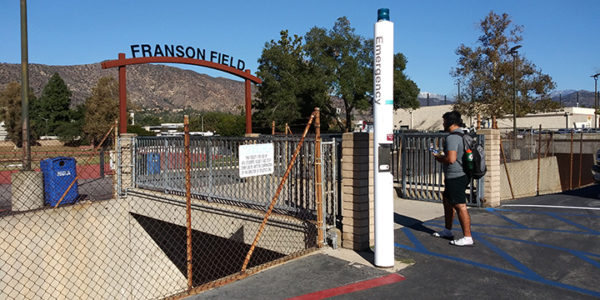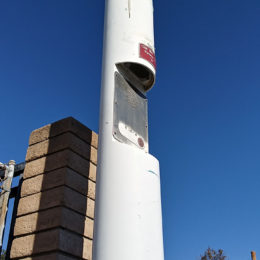With tools assisting Campus Safety such as the Guardian app or the Alertus Beacons located around campus, communication between students and security is growing to be more accessible each year.
With the recent Annual Implementation Plan of 2018-2019, Campus Safety, TeC Services, and Facilities are working together to install blue light emergency phones around campus that will provide rapid communication between students and campus safety. These phones will be installed before the end of the spring 2019 semester.
Campus Safety Supervisor Benjamin Macias explained the function of these phones over email.

“The blue light emergency phones will provide a one button access to Campus Safety 24/7,” Macias said. “Many years ago, campus payphones served in this capacity… These new phones will update that antiquated feature as they will serve in the same function.”
These glowing blue emergency phones will stand at ten feet and come equipped with a four-speaker PA system that will tie into the District’s emergency notification system. With this system, Macias said that campus safety will be able to broadcast emergency notifications to a wide area.
Macias said the goal is to install 10 emergency phones throughout campus within the first year of the installation plan. Additional phones will be later installed within the five years after. Though Macias said implementation each phone can range from $5,000 to $15,000, Director of Facilities and Construction Fred Diamond said that the total cost for installation of the emergency phones has not been finalized.
“The installation would include the technology cabling (phone & data) and the electrical cabling (power).” Diamond said over email. “Additionally within the installation there would be trenching, conduit, backfilling, placement of concrete/asphalt, steel for bolting, etc.”
Diamond also said that precise locations of the phones will be predicted based on the availability of power and data. “… one of the big decisions will be whether the data is provided by WiFi or is provided by actual cabling,” Diamond said.
“Once all of these items are rectified, the total cost will be known only after bidding has occurred.”
With the price of individual phones being so high, some question whether or not their benefits outweigh their costs. In a 2009 article, Valerie Lucus-McEwen — a previous emergency manager and business continuity professional at UC Davis — was not supportive of their installation.

“I’m a parent,” Lucus-McEwen said. “I have a daughter in college. I’d vote to take the blue-light phones out and apply that money against the next tuition hike.”
However, Citrus photography student Marie-Andrée Chinchilla supported installation of the phones. “I think that’s awesome!” Chinchilla said. “It’s like a cushion, knowing that you could run to one if you needed. I think it’s a really good idea. I’m surprised they didn’t already have them.”
Chinchilla is currently taking History of Photography on Mondays, from 7 p.m. to 10 p.m. Leaving class so late at night, she said it was often an unnerving experience when walking alone.
“It’s so scary,” Chinchilla said. “I’m five-one, walking out at 10 p.m. You see the occasional campus safety officer, but what are they going to do when they’re across campus?”
Though Chinchilla said she always carries her pepper spray on her keychain, she said having the protection of the blue light emergency phones would make her feel much safer on campus.
With their installation students will have faster access to assistance from campus safety, promoting a safer learning environment for students and Citrus College staff alike. When these emergency phones are finally installed this spring semester, they might be able to help prevent further crimes like the recent invasions of privacy on campus.


